News
Imo Assembly urges Gov Uzodinma to rename International Conference Centre after Iwuanyanwu
Published
7 months agoon
By
Ekwutos Blog
The Imo State House of Assembly has urged Governor Hope Uzodinma to rename the Imo International Conference Centre (IICC) in honour of the late President General Ohaneze Ndigbo, Chief Emmanuel Iwuanyanwu.
The Assembly said the proposed gesture is a way of immortalizing Iwuanyanwu following his numerous contributions to economic and human development in the state in particular and the nation in general.
The call was made through a motion moved by the member representing Mbaitoli Constituency, Innocent Ikpamezie, on the floor of the Assembly.
Presenting the motion, Ikpamezie narrated that Iwuanyanwu is a worthy and an illustrious son of not only Imo State but the South-East region who has distinguished himself in various human endeavors.
He maintained that late Iwuanyanwu has in no small measure contributed immensely towards the upliftment of the state pointing out that, during the building of the state’s International Cargo Airport, he donated a significant amount of money that led to the realization of the project.
“Chief Emmanuel Iwuanyanwu as an international entrepreneur played a significant role in setting the pace for economic development in the South-East region and the nation at large.
“His philanthropic works in Nigeria worth billions of naira and remain unforgettable having provided good roads, water, homes for destitute as well as awarded scholarships to many students at secondary and university levels,” he said.
The lawmaker noted that Iwuanyanwu died in active service as the President General of Ohanaeze Ndigbo also President of Owerri Peoples Assembly, explaining that under his leadership he preached peace, unity and oneness of the Igbo race.
He enjoined his colleagues to join in urging the governor to immortalize Iwuanyanwu by renaming the Imo International Conference Centre after him.
Lending their contributions some of the members enumerated some remarkable contributions of Iwuanyanwu in many aspects of human life.
The Deputy Speaker, Amara Chyna Iwuanyanwu described the late President General Ohanaeze Ndigbo as an employer of labour who has built many business establishments within and outside southeast region.
“Iwuanyanwu has through his philanthropic gestures and numerous establishments gainfully engaged many people.
“Significant establishments to mention are the establishment of Champion Newspaper and Iwuanyanwu Nationale Football Club which have engaged many people, mostly youths of the country.”
The member representing Isiala Mbano Constituency, Samuel Osuji said that he personally benefited from Iwuanyanwu who offered him a contract that changed his life, maintaining that immortalizing him is not out of place as he has positively touched many lives.
The members, after their contributions later adopted the motion and resolved to urge the governor to immortalize the late Chief Iwuanyanwu.
You may like


Na our mama be this o, we no get another one Stud£nt chorus ; Na your mama be this o eh And the Nursing school managem£nt issued query just because of the stud£nts chorus and allegedly have plans to punish them for what they did.
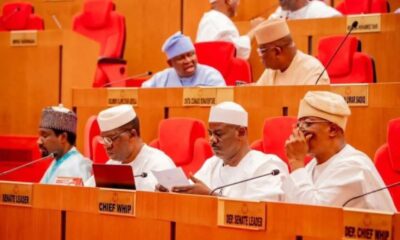

The senate has called on the federal government to take urgent action to address the rising cost of data services in the country.
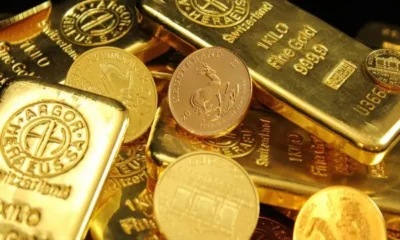

Tariff uncertainties to keep gold prices in India between Rs 87-90K range in H1-2025: Report
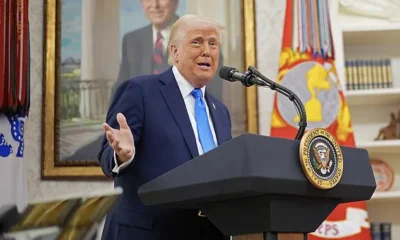

The telling sign Trump is walking back his public feud with Canada
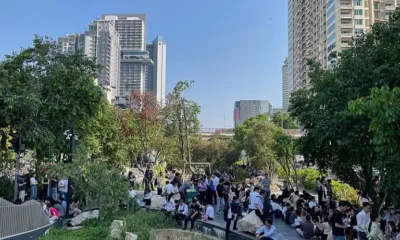

Is it safe to travel to Thailand and is Bangkok airport open? Latest advice after Myanmar earthquake
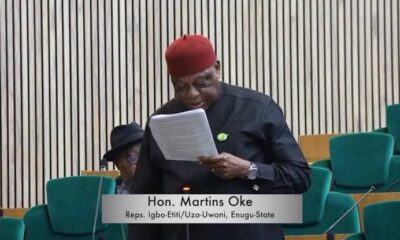

BREAKING: INEC Receives Petition to Recall Federal Lawmaker Martins Oke
Business
Tariff uncertainties to keep gold prices in India between Rs 87-90K range in H1-2025: Report
Published
23 hours agoon
March 29, 2025By
Ekwutos Blog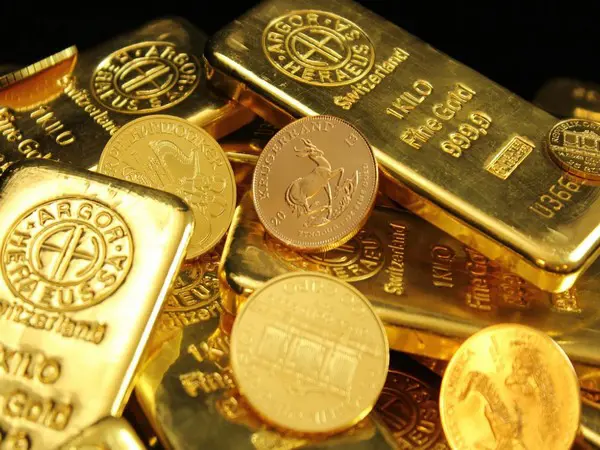
New Delhi [India], March 29 (ANI): US tariff uncertainties are likely to push gold prices to Rs 87,000- Rs 90,000 in the first half of the calendar year 2025 (January- June), according to a report by ICICI Bank Global Markets.
Currently, the gold prices are at around Rs 83,410 per 10 grams for 22-carat and Rs 90,990 per 10 grams for 24-carat, publicly available data showed.
The report added that the uncertainties arising due to the tariffs will ensure the investment-related demand for gold is in place.
Beginning on April 2, the Trump administration intends to implement reciprocal tariffs on trading partners as part of the “Fair and Reciprocal Plan”.
In India, the local gold prices rose by 4 per cent in the past month, reflecting the global market trend and an appreciation of 2 per cent in rupee terms against the US dollar.
“Going forward, local gold prices are expected to trade with an upside bias in the INR 87,000 per ten grams to Rs 90,000 per ten grams range in 1H2025 and moving to the Rs 94,000 per ten grams to the Rs 96,000 per ten grams range in 2H2025,” the report added.
The report anticipated that the gold prices in the global markets will be in the range of USD 3200 per ounce to USD 3400 per ounce level by December 2025.
Additionally, the US Federal Reserve‘s potential decision to lower interest rates in 2025 and 2026 could make gold more attractive, as lower US yields may support gold demand, the report added.
Central banks may also continue to diversify their reserves by holding more gold, which could keep prices steady for the long term, as per the report.
“Elevated levels of gold prices appear to be weighing on jewellery demand, which worked to pull gold imports to their lowest level in the past 11 months, at USD 2.3bn, reflecting a 14 per cent MoM decline and a 63 per cent YoY decline. Demand should pick up, responding to the festive related seasonal demand that tends to take place,” the report added.
However, gold fund flows into local ETFs still remain fairly robust, as the World Gold Council (WGC) has reported. Gold ETFs recorded inflows to the tune of Rs 19.8bn in February 2025 that were above the average net inflow of Rs 14.8bn recorded in the preceding nine months.
News
Is it safe to travel to Thailand and is Bangkok airport open? Latest advice after Myanmar earthquake
Published
1 day agoon
March 29, 2025By
Ekwutos Blog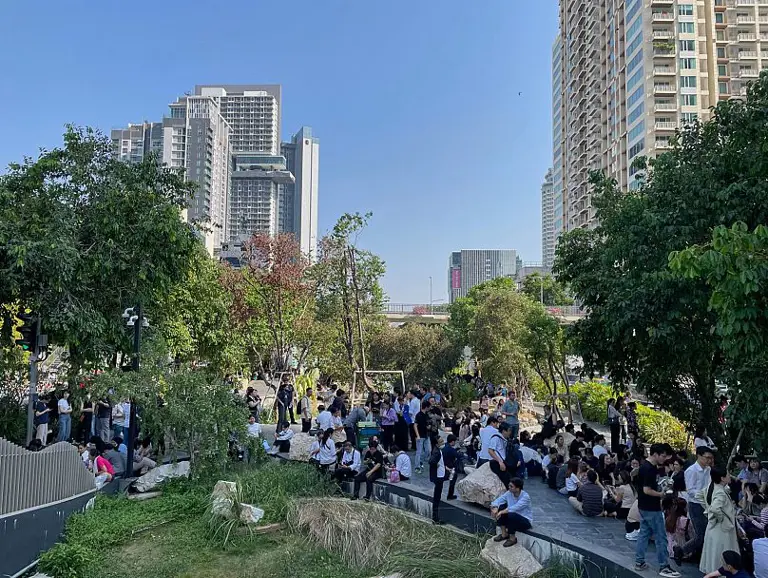
A7.7 magnitude earthquake struck Myanmar at midday local time on 28 March, sending violent tremors across Thailand and as far as China.
The jolt caused a skyscraper to crumble in the Thai capital Bangkok, causing three deaths and leaving 81 people still missing under the rubble.
European governments have updated their travel advice for tourists in Thailand and with upcoming trips. Here’s what you need to know about safety and travel insurance.
State of emergency declared in six regions in Myanmar
The earthquake, whose epicentre was near the city of Mandalay in Myanmar, has caused dozens of buildings to collapse. Its shallow depth of 10 metres amplified the ground-level impact.
A 6.4 magnitude aftershock was also felt 12 minutes later near the city, the US Geological Survey reported, with tremors being felt as far away as Laos, Bangladesh and China.
Footage reportedly filmed inside Mandalay airport shows people running through dust-filled hallways and huddled on the floor outside the building for safety.
In the town of Taungoo in Myanmar, the partial collapse of a mosque killed two people, according to Reuters.
Local media reports that at least two people have died and 20 have been injured after a hotel crumbled in Aungban in the south of the country.
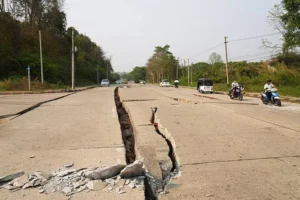
A state of emergency has been declared in six regions and states in Myanmar by authorities. Copyright 2025 The Associated Press. All rights reserved.
There are likely many more casualties across the country, but its volatile political situation under a military-run government means journalists have restricted access and reports from the ground are difficult to verify.
A state of emergency has been declared in six regions and states in Myanmar by authorities.
In Bangkok, the tower block that came down was under construction. A rescue worker said seven people had been found alive but 81 people are still missing.
Authorities have reportedly received 169 calls about damage to buildings in the Thai capital. It has been declared a ‘disaster area’.
Hundreds of residents and tourists have been evacuated to the streets from high-rise buildings and hotels, while there are reports of water sloshing out of swimming pools in several parts of the city.
Is it safe to travel to Thailand?
Thailand is a tourism hotspot which is seeing a spike in visitors after the HBO series The White Lotus was set in a resort in the country.
After the earthquake rocked the capital Bangkok, urban rail and metro systems were temporarily closed and are expected to resume services on Saturday.
Bangkok’s Suvarnabhumi airport was briefly shut down in the immediate aftermath but has now reopened, with flights operating normally. Thailand’s other major airports have not experienced disruption.
Local authorities have advised the public to avoid high-rise buildings, which crowd the densely populated city.
The UK’s Foreign, Commonwealth & Development Office (FCDO) has updated its travel advice for Thailand.
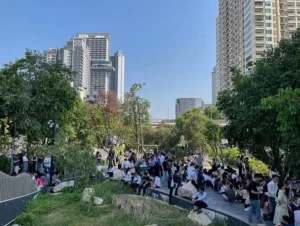
Hundreds of residents and tourists have been evacuated to the streets from high-rise buildings and hotels Associated Press
“If you’re in the area or planning to travel there, follow the advice of the local authorities or your tour operator and monitor local media,” it urges travellers.
Ireland’s Department of Foreign Affairs and Trade (DFAT) has updated its security status for Thailand to ‘high degree of caution’.
“We encourage citizens to follow the instructions of local authorities in the event of an emergency,” it has said.
There is also ongoing advice (unrelated to the earthquake) from the FCDO against all but essential travel to parts of south Thailand near the Thailand-Malaysia border.
This includes the Pattani, Yala and Narathiwat Provinces and the southern Songkhla Province south of the A43 road between Hat Yai and Sakom and south of the train line which runs between Hat Yai and Padang Besar.
FCDO also advises against all but essential travel on the Hat Yai to Padang Besar train line that runs through these provinces. This is due to regular attacks in these areas by the border with Malaysia.
Is it safe to travel to Myanmar?
The FCDO has also issued updated advice for travellers in Myanmar, stating that the epicentre is in the Sagaing region near Mandalay, but other areas may also be affected.
“Mandalay airport is reportedly closed. There may be several strong after-shocks.
“If you’re in the area or planning to travel there, follow the advice of the local authorities and monitor local media.”
Am I covered by travel insurance if I go ahead with my trip to Thailand?
The UK foreign office warns that your travel insurance could be invalidated if you travel against its advice. This means going to areas where it advises against all but essential travel.
As it has not issued a ‘no-go’ warning for earthquake-affected zones, you are not automatically entitled to a refund if you cancel your trip – referred to as ‘disinclination to travel’.
Reimbursement is only likely if your flight is cancelled by the airline or your accommodation is closed due to the earthquake.
If you have booked with a travel agent or tour operator, contact the company directly to understand your options.
“If you are travelling to Thailand over the next few days, speak to your airline or travel operator in the first instance. It may be that some regions of Thailand will be deemed unsafe to travel, in which case airlines will cancel flights, but disruption is likely to be localised so it will depend on which region you are travelling to,” says Ernesto Suarez, CEO of travel insurance providers Gigasure.
“When disruption is caused by natural disasters or circumstances outside of an airline’s control, passengers are normally allowed to change their booking, but you may not be entitled to any additional compensation.
Some insurance policies include natural disaster cover for an event that prevents travellers from reaching their holiday destination. You should read the terms and conditions carefully and talk to your provider for advice.
News
Government Pushes for Constructive Dialogue to Resolve Egbu/Uratta Layout Land Case
Published
1 day agoon
March 29, 2025By
Ekwutos Blog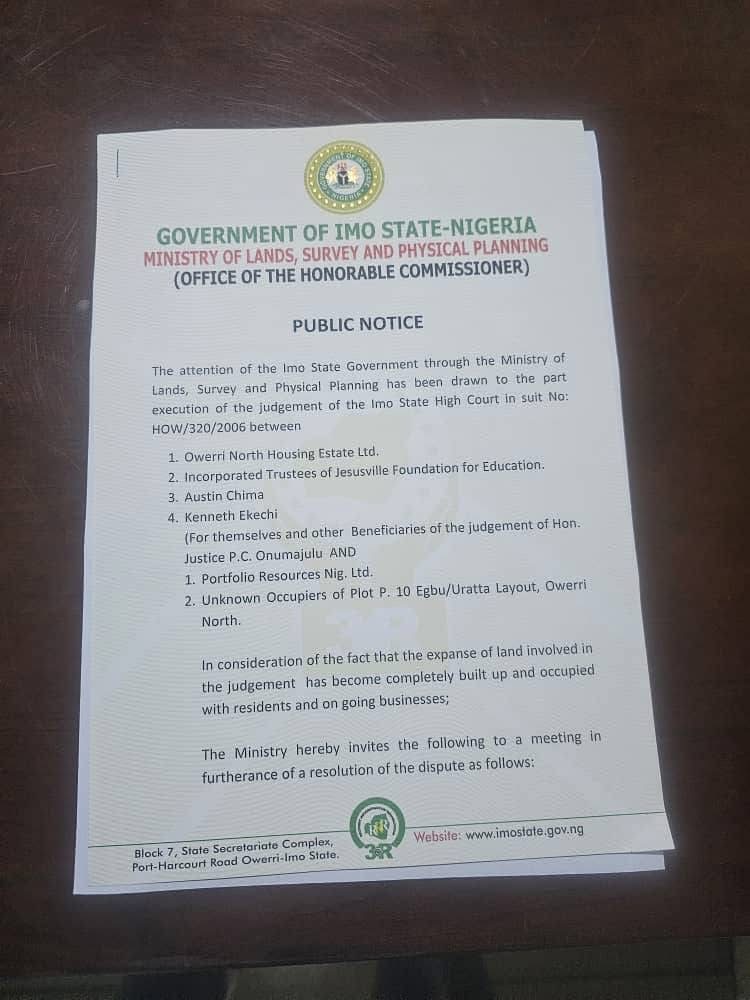
The Imo State Government, through the Ministry of Lands, Survey, and Physical Planning, has taken steps to address a long-standing land dispute by inviting the concerned parties to a resolution meeting. The public notice, issued on March 28, 2025, and signed by the Honorable Commissioner, Chief Enyinna Onuegbu, outlines the details of the initiative.
The dispute stems from the partial execution of a judgment by the Imo State High Court in suit No: HOW/320/2006. This legal case involves several parties, including Owerri North Housing Estate Ltd., the Incorporated Trustees of Jesusville Foundation for Education, Austin Chima, Kenneth Ekechi, Portfolio Resources Nig. Ltd., and the unknown occupants of Plot P. 10, Egbu/Uratta Layout in Owerri North.
According to the notice, the land in question has since been developed and is now occupied by both residents and businesses, making the resolution of this issue crucial. The Ministry has invited the following parties to a meeting aimed at finding an amicable settlement:
1. Representative of Owerri North Housing Estate Ltd.
2. Representative of the Incorporated Trustees of Jesusville Foundation for Education.
3. Mr. Austin Chima.
4. Mr. Kenneth Ekechi.
5. Representative of Portfolio Resources Nig. Ltd.
6. Representative of the unknown occupants of Plot P. 10, Egbu/Uratta Layout.
The meeting is scheduled to take place as follows:
**Date**: Wednesday, April 2, 2025
**Time**: 11:00 AM
**Venue**: Office of the Honorable Commissioner, Ministry of Lands, Survey, and Physical Planning.
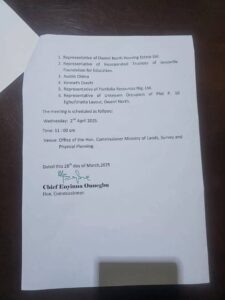
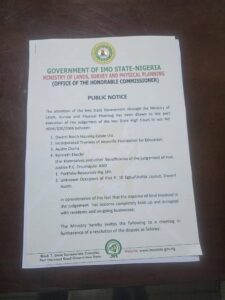
This effort demonstrates the government’s commitment to resolving disputes and ensuring harmonious coexistence within the state.
Stakeholders are urged to attend the meeting as scheduled to contribute to a fair and lasting resolution.

Na our mama be this o, we no get another one Stud£nt chorus ; Na your mama be this o eh And the Nursing school managem£nt issued query just because of the stud£nts chorus and allegedly have plans to punish them for what they did.

The senate has called on the federal government to take urgent action to address the rising cost of data services in the country.

Tariff uncertainties to keep gold prices in India between Rs 87-90K range in H1-2025: Report
Trending

 Trending5 months ago
Trending5 months agoNYA demands release of ‘abducted’ Imo chairman, preaches good governance
- Business5 months ago
US court acquits Air Peace boss, slams Mayfield $4000 fine

 Politics5 months ago
Politics5 months agoMexico’s new president causes concern just weeks before the US elections
- Entertainment5 months ago
Bobrisky transferred from Immigration to FCID, spends night behind bars
- Entertainment5 months ago
Bobrisky falls ill in police custody, rushed to hospital

 Politics5 months ago
Politics5 months agoRussia bans imports of agro-products from Kazakhstan after refusal to join BRICS

 Politics5 months ago
Politics5 months agoPutin invites 20 world leaders
- Politics1 year ago
Nigerian Senate passes Bill seeking the establishment of the South East Development Commission.

